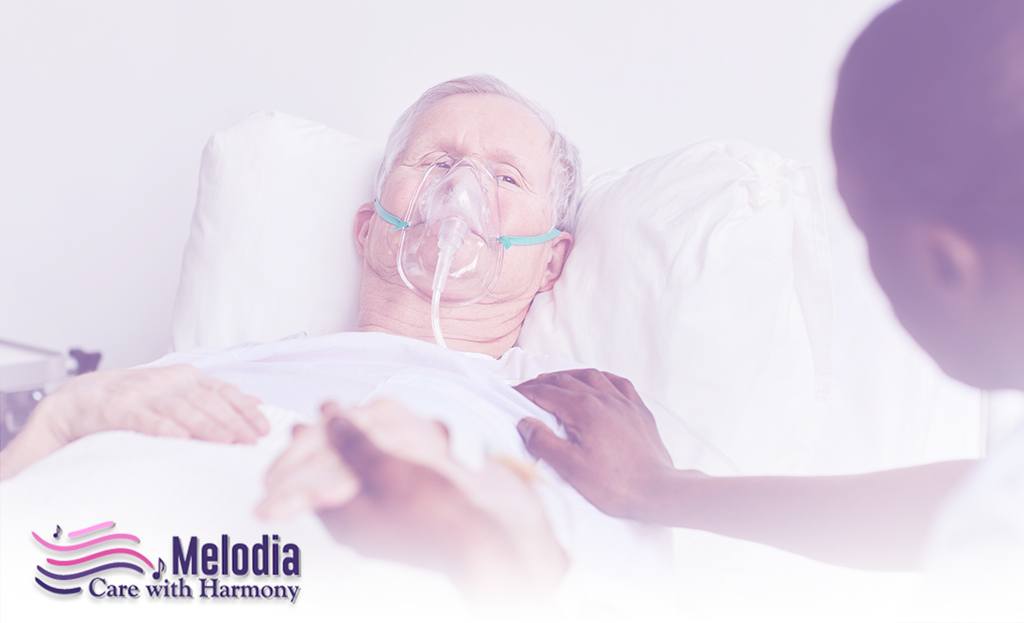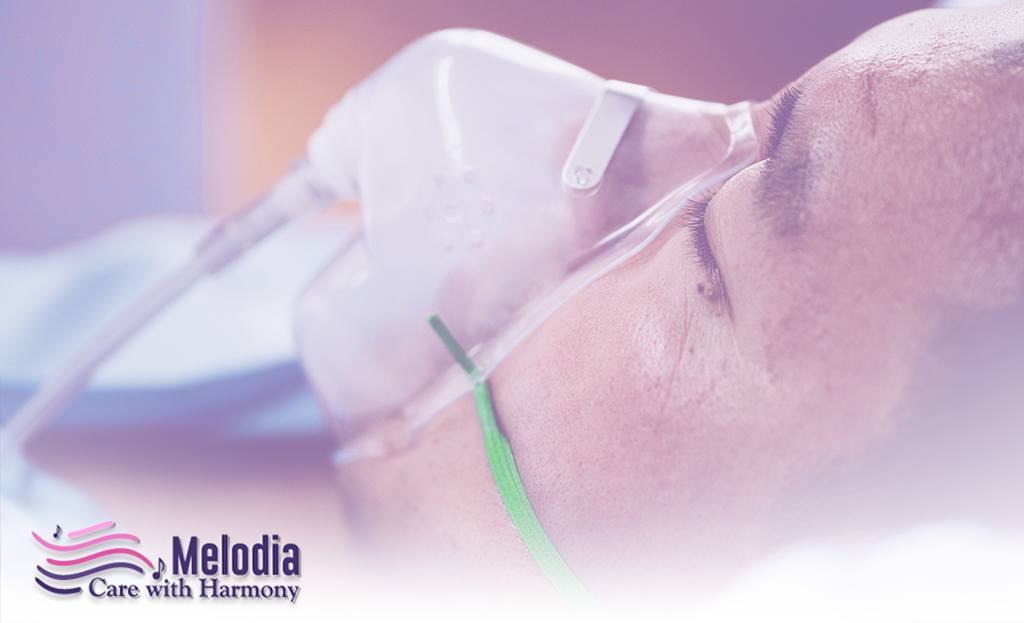Pneumonia is an inflammation of the lungs that affects alveoli and consolidation (fluid in a usually filled space). Pneumonia is a common disease that will seriously affect the morbidity and mortality of the elderly. Pneumonia is usually a terminal event that complicates long-term conditions (dementia, cancer, prolonged immobilization syndrome). Anyone can get pneumonia, with symptoms ranging from mild to severe. Older people may be more susceptible to pneumonia and encountering serious complications. Because of these higher risks, caregivers need to recognize the early symptoms of pneumonia in the elderly.
Elderly patients will have some clinical problems, which must be considered when deciding the best care environment: delirium, hypoxic respiratory failure and severe sepsis. The assessment of the severity of the disease helps determine the best care environment. Patients with dementia often get pneumonia and often die from pneumonia, which is associated with high levels of discomfort.
Who Is At Risk?
Pneumonia is a lung infection that can sometimes cause severe or life-threatening illness and even death. If left untreated, the infection can quickly get worse and life-threatening. If you or your loved one has symptoms of pneumonia, it is important to see a doctor, especially if you have certain risk factors. Early diagnosis is the key and can lead to better results.
Pneumonia can affect anyone. But some people have an increased risk of serious or life-threatening infections. Generally speaking, those at greatest risk have weaker immune systems or have diseases or lifestyle factors that affect the lungs. People at increased risk of severe or life-threatening cases of pneumonia include:
- Adults 65 years and older
- People in hospital, especially if they are placed on a ventilator
- Individuals with chronic diseases or conditions, such as asthma, chronic obstructive pulmonary disease or diabetes
- People with weakened immune systems due to chronic diseases, chemotherapy or organ transplants
- Smoker
Palliative Care Intervention For Pneumonia

Pneumonia is a common end-of-life complication in many progressive chronic diseases (including dementia, malignant tumors, neurodegenerative diseases, respiratory system and rheumatism). There are many people in various care settings, including home, long-term care and acute care. A palliative/comfort-focused approach has been chosen for life-threatening diseases.
The Focus Should Be On The Goals Of Nursing & Symptom Management
- Rest
- Oral hydration (helps loosen mucus)
- Intravenous fluids (if indicated and consistent with treatment preferences and goals of care)
- Oxygen for the treatment of hypoxemia (based on symptom relief rather than pulse oximetry at the time of Enol)
- Cough antitussive drug
- Morphine, an anxiolytic drug for breathing difficulties
- Anticholinergic (scopolamine, atropine) for excessive secretion
- Choose medications based on the balance of benefits and adverse reactions (e.g.: Guaifenesin may aggravate nausea; scopolamine causes dry/thick secretions and cause dry mouth and sedation, which may be undesirable for patients)
- Provide emotional support for residents and families
Precautions For Drug Selection

• Long-acting pharmaceutical preparations (sustained release, “CONTIN” preparations or transdermal fentanyl preparations) should not be used to control rapidly developing symptoms.
• If death is approaching and the patient has already taken a stable dose of transdermal fentanyl, he should continue using it and adding additional short-acting opioids to increase comfort. Morphine and hydromorphone are listed as opioids because they are generally available and can be used in a variety of ways.
Stages Of Pneumonia
The four stages of lobar pneumonia include:
Stage 1: Congestion

During the congestion phase, the lungs become very heavy and congested due to the accumulation of infectious fluid in the air sacs. At this stage, your elderly relatives may have early symptoms of pneumonia, such as:
- Cough
- Heaviness in the chest
- Loss of appetite
- Fatigue
- Shortness of breath
Stage 2: Red Hepatization

Red blood cells and immune cells that enter the fluid-filled lungs to fight infection make the lungs red. Although the body begins to fight infection at this stage, your loved one may experience worsening symptoms, such as:
- Increasing cough
- Shortness of breath
- Muscle aches
- Headache
- Extreme fatigue fever
- Chills
- Sweating
- Blue lips or nails due to low oxygen levels in the blood
At this stage, some older people may feel confused or delirium. If your elderly relatives have severe symptoms such as difficulty breathing, high fever, blue lips or nails, you should seek emergency treatment or call 9-1-1.
Stage 3: Gray Hepatization

At this stage, red blood cells will break down, making the lungs gray. However, immune cells are still present and symptoms may persist.
Stage 4: Resolve In the Remission Phase

Older people may begin to feel better as immune cells clear the infection from the body. However, they may produce an effective cough, which helps drain fluid from the lungs.
What Is Multiple Sclerosis?
Multiple sclerosis (MS) is a neurological disorder that affects the brain and spinal cord’s nerves. MS affects about 400,000 persons in the United States and affects almost three times as many women as males. Individuals are typically diagnosed in their 30s, 40s or 50s.
Complications
- Bacteremia (bacteria in the blood)
- Pleural effusion (effusion around the lungs)
- Lung abscess
- Septic shock
- Acute Respiratory Distress Syndrome (ARDS)
- Respiratory failure Treatment (pneumonia does not always require antibiotic treatment)
- Oxygen therapy
- Antibiotics (if it meets treatment preferences and goals of care)
- Anti-fever medicine
- Analgesics (ibuprofen, acetaminophen)
- Bronchodilator treatment
Signs/Symptoms

Common symptoms:
- Fever
- Chills
- Expectoration of sputum or pus,
- Changes in mental status,
- Pleurisy pain when breathing or coughing,
- Fatigue
- Nausea
- Vomiting
- Diarrhea
- Lethargy
- Dehydration
- Anorexia
- Difficulty breathing
- Older people with lower than average body temperature
- Hypoxia
Recognize Symptoms
If you or your loved one has the following symptoms, you should make an appointment with your doctor to evaluate possible pneumonia:
• Abnormal body temperatures, such as fever and chills in the elderly or people with weakened immune systems or lower-than-normal body temperature
• Shortness of breath or difficulty breathing
• Cough, which may be accompanied by mucus or sputum
• Chest pain when coughing or breathing
• Tiredness or fatigue
• Confusion, especially among the elderly
• Nausea, vomiting or diarrhea
Why Does It Happen?
• It weakens immune systems or suffers from chronic or acute diseases.
• Therefore, these people may not get the care they need until the infection becomes severe. It is very important to understand the development of any symptoms and seek medical attention in time.
• In addition, pneumonia will aggravate existing chronic diseases, especially heart and lung chronic diseases.
Risk Factors:
Pneumonia can affect anyone. But the two age groups at highest risk are:
• Children 2 years or younger
• Elderly (65 years old or above)
Other Risk Factors Include:
• Hospitalized. If you are in the intensive care unit, you are at greater risk of pneumonia, especially if you are using a machine (ventilator) that helps you breathe.
• Chronic diseases. If you have asthma, chronic obstructive pulmonary disease (COPD) or heart disease, you are more likely to get pneumonia.
• Your body’s natural defenses against bacteria and viruses that cause pneumonia are severely affected by smoking
• Weaken or suppress the immune system. People who have HIV/AIDS, have received organ transplants or chemotherapy or have been using steroids for a long time are at risk.
Preventive Treatment Of Pneumonia

Pneumococcus is one of the common causes of bacterial pneumonia. Preventive measures are recommended for adults over 65, very young children or anyone between the ages of 2 and 64 who suffers from specific chronic health problems, weakened immune systems or smokes. Two vaccines can help prevent this type of pneumonia. Discuss the need for these vaccines with your healthcare provider.
Getting the flu vaccine once a year helps to reduce pneumonia caused by the flu and bacterial pneumonia that sometimes appears after the flu. Ask your healthcare provider which vaccine is best for you. Other preventive measures include:
• Reasonable medical control of chronic lung and sinus problems
• Good hand washing
• Avoiding smoking
• If you smoke, consult your doctor about ways to quit smoking.
End Of Life Care For Advanced Stage Pneumonia
If you have symptoms of the advanced stage of pneumonia, please consult your healthcare provider. Early treatment makes them easier to control. It will also make you more comfortable. Healthcare providers treat confusion and agitation by addressing the root cause where possible. At the end of life, these symptoms may have many reasons. Regardless of the cause, the symptoms must be treated. Usually, this involves medications that help you calm down. Medications can also help you think more clearly.
Things your family can do:
• Keep the clock nearby so you can see the time
• If possible, continue to help you wear hearing aids or glasses
• Give you pain medicine
• Speak calmly and softly
• Place familiar objects around you
• Promote relaxation and sleep
• If recommended by your healthcare provider, give you oxygen
• Give you medicine to treat delirium
• Avoid doing anything that makes you feel uncomfortable or scared
Depression & Anxiety

The time to cause death can be challenging. Feeling sad and anxious is normal and expected. If you feel that depression and anxiety affect most areas of your life, please consult your healthcare provider. Sometimes, your loved one may feel depressed or anxious. Ask your doctor, nurse or social worker about the support services available for caregivers or reading caregivers support services. Treatment of Depression and anxiety can be carried out with talk therapy, medication or both. Discuss your feelings with your medical team so they can help you.
Pain Control:
Is an integral part of palliative care and very important at the end of your life, if you have any new or worsening pain.
Conclusion:
The rapid deterioration in the last few days of life may be surprising to many people and disturbing to family members who may feel that they have missed the opportunity to say goodbye.
When pneumonia develops with the gradual decline in physical and cognitive abilities, there is almost no physiological reserve to slow down the deterioration; it’s much like a person being supported by fragile ice, any additional burden will cause a sudden fall
Sometimes, medications given for comfort are the culprit responsible for the rapid changes seen. It may be necessary to review the sequence of changes with the family, reiterate the need for comfort and redefine the method of care as “What do they want in these situations?
You can reach Melodia Care at any time of day or night by contacting us through our 24/7 online customer support chat or by calling 1-888 635-6347 (MELODI-7).










